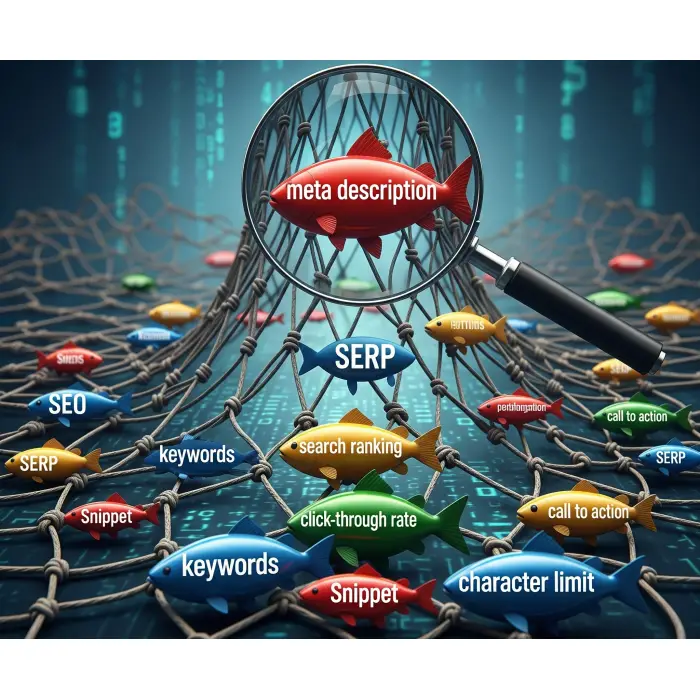
AI-Powered Keyword Research: The Future of SEO Strategy in 2025

search engine optimisation has always been about one thing: understanding what people are searching for and creating content that meets that demand. For decades, keyword research has been the foundation of successful SEO strategies. But in 2025, the landscape has changed dramatically. Traditional methods alone are no longer enough. Enter AI-powered keyword research ? a smarter, faster, and more accurate way to uncover profitable opportunities, reduce guesswork, and stay ahead of the competition.
Recommended for You


The Ultimate Guide to Cervical Pillows: Pain Relief, Sleep Styles & Buying Tips (2025 Edition)
How to Choose the Best Cervical Pillow (2025): Sleep Better & Ease Neck PainDiscover the best…
How to Write a Meta Description for a Blog Post
The Secret Sauce of Success: How to Write a Meta Description for a Blog Post That Gets Clicks (and…In this guide, we?ll explore how AI is reshaping keyword research, why it matters for your business, and how you can implement AI-driven strategies that actually deliver results. Whether you?re a blogger, digital marketer, or small business owner, this post will show you how to embrace AI for competitive advantage.
Why Keyword Research Matters More Than Ever
Before diving into artificial intelligence, let?s revisit the basics. Keyword research isn?t just about finding words with high search volume. It?s about understanding intent. When someone types or speaks a query into Google, they?re revealing a problem, a curiosity, or a desire. Your job is to match that intent with valuable, relevant, and engaging content.
The problem? Manual keyword research is time-consuming and often overwhelming. With billions of search queries happening every day, how do you know which ones are worth your attention? That?s where AI steps in.
What Is AI-Powered Keyword Research?
AI-powered keyword research refers to the use of artificial intelligence, natural language processing, and machine learning algorithms to automate and enhance the process of discovering keywords. Instead of manually pulling data from multiple tools and guessing user intent, AI analyses vast datasets in seconds, identifies patterns, and suggests keywords with higher accuracy.
AI doesn?t just give you numbers ? it provides context. For example, it can distinguish between informational, navigational, and transactional queries, and even predict emerging trends before they spike in search volume.
How It Differs From Traditional Keyword Research
- Traditional: Relies on static tools, limited databases, and manual filtering.
- AI-driven: Continuously learns from real-time data, analyses user behaviour, and clusters keywords by relevance, intent, and conversion potential.
Benefits of AI-Powered Keyword Research
So why should you care? Here are the biggest advantages:
- Speed: Analyse thousands of keywords in seconds instead of hours.
- Accuracy: AI reduces guesswork and helps prioritise high-converting keywords.
- Trend Detection: Spot emerging topics before competitors do.
- Content Gap Analysis: AI tools highlight what your competitors missed.
- Search Intent Clustering: Group related keywords automatically for better topic authority.
- Voice & AI Search Optimisation: Discover conversational, long-tail queries ideal for Google?s AI Overviews and voice assistants.
How AI Tools Perform Keyword Research
Different AI-driven platforms use various techniques, but here?s a breakdown of the common methods:
1. Natural Language Processing (NLP)
AI understands the context behind search queries, not just the words. For instance, ?best coffee shops near me? is categorised as a local, intent-driven search, while ?history of coffee beans? is informational. This ensures your content matches the exact type of search intent.
2. Predictive Analytics
AI forecasts which keywords are likely to gain popularity, allowing you to create content before the wave hits. Think of it as surfing on search trends rather than chasing them after they peak.
3. Semantic Clustering
Instead of focusing on a single keyword, AI groups related terms into clusters. This enables you to create comprehensive pillar pages with supporting subtopics, boosting topical authority and search rankings.
You Might Enjoy

Health Benefits Of Valerian Officinalis
Health Benefits Of Valerian Officinalis: commonly known as valerian, is a medicinal herb known for…
MLM Gateway review 2025
If You Are an MLM Person, Welcome to this MLM Gateway Review 2024 Welcome to this MLM Gateway…
Goldenseal Health Benefits
Goldenseal health benefits Health Benefits: Goldenseal (Hydrastis canadensis) is a perennial herb…4. Competitor Analysis
AI doesn?t just analyse your site; it reverse-engineers competitor content, showing you what keywords drive their traffic and what gaps you can exploit.
Best AI-Powered Keyword Research Tools in 2025
There are dozens of AI tools in the market, but here are some leading options worth considering:
- SurferSEO: Uses AI to generate keyword clusters and optimise on-page SEO.
- WriterZen: Known for its topic discovery and keyword clustering features.
- Jasper SEO Mode: AI-assisted writing with keyword optimisation built in.
- Clearscope: Semantic keyword suggestions for content depth and authority.
- Frase: AI content briefs and intent-based keyword research.
- ChatGPT Plugins: Custom workflows that combine multiple data sources for research.
For a deeper look at reviews, see our guide on best AI SEO tools.
Step-by-Step Guide: Doing Keyword Research with AI
Let?s walk through an actionable process:
Step 1: Define Your Goals
Are you targeting traffic, conversions, or brand authority? AI can recommend different keywords depending on your goals.
Step 2: Input Seed Keywords
Start with a broad term relevant to your niche. AI expands it into clusters, synonyms, and intent variations.
Step 3: Analyse Search Intent
AI categorises terms into informational, commercial, or transactional ? crucial for matching content formats.
Step 4: Build Clusters
Create pillar posts (e.g., ?AI-Powered SEO Strategy?) and supporting posts (e.g., ?AI for long-tail keyword clustering?).
Step 5: Validate with Human Insight
AI accelerates research, but human creativity ensures engaging, story-driven content that resonates.
AI and Search Generative Experience (SGE)
With Google rolling out AI-powered search overviews, optimising for traditional SERPs isn?t enough. AI-powered keyword research helps identify conversational queries that SGE highlights. Instead of targeting just ?AI keyword research,? you might aim for natural questions like:
- ?How can I use AI for keyword research as a beginner??
- ?Which AI tool is best for finding long-tail SEO keywords??
- ?Is AI better than traditional keyword tools??
These conversational queries are more likely to appear in AI-generated search summaries, giving your site a higher chance of visibility.
Common Mistakes to Avoid
AI is powerful, but it?s not foolproof. Here are mistakes to avoid:
- Over-automation: Don?t blindly follow AI suggestions without context.
- Ignoring Human Creativity: AI finds keywords, but people connect with stories.
- Keyword Stuffing: Google?s algorithms still penalise unnatural content.
- Neglecting Search Intent: Ranking is meaningless if it doesn?t convert.
Case Study: AI Keyword Research in Action
Let?s imagine a blogger who runs a site about sustainable fashion. Traditionally, they might target ?eco-friendly clothing.? AI research, however, could reveal clusters like:
More Reads You’ll Love

3 Positive Aspects of Keywords and Niche Research Tool
Jaaxy Keywords and Niche Research Tool Analysis Jaaxy keywords and niche research tool stand out as…
Significance of Link Building
Power Of Link Building The Significance of Link Building: Unveiling the Path to Online Success. The…
Art Business Opportunities
In today's dynamic marketplace, the allure of the art business beckons entrepreneurs with promises…- Best eco-friendly fabrics for summer
- AI tools for sustainable fashion brands
- Affordable organic cotton alternatives
- Zero-waste fashion trends 2025
By targeting these clusters, the blogger not only increases traffic but also builds topical authority around sustainability. This is how AI transforms keyword research from a guessing game into a growth engine.
Future of Keyword Research with AI
Looking ahead, AI-powered keyword research will become more integrated with content creation itself. Imagine drafting a blog post where AI automatically suggests high-traffic keywords, optimal headings, and even competitor insights ? all in real-time. This future is closer than you think, and those who adapt early will reap the benefits.
Final Thoughts
AI-powered keyword research is no longer a buzzword ? it?s the new standard for smart marketers. By combining AI insights with human creativity, you can uncover profitable opportunities, build topical authority, and future-proof your SEO strategy. The key is not to replace human effort but to enhance it. Think of AI as your assistant ? one that never sleeps, analyses faster, and helps you stay ahead of competitors.
Ready to take action? Start experimenting with AI tools, build keyword clusters around your niche, and focus on intent-driven content. In 2025, success in SEO belongs to those who embrace AI early and wisely.
Internal Resources You May Like
Other Topics That Might Interest You

Best House Painting Ideas by Painting Contractor San Francisco
Residential and Commercial Painting Companies in America: A Comprehensive Guide Painting is a…
Residential and commercial painting companies in Atlanta
Residential and Commercial Painting Companies in Kenya: A Comprehensive Guide Painting is more than…



Comments